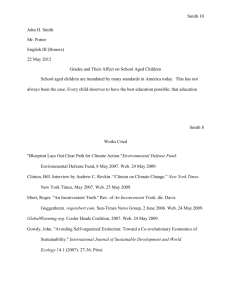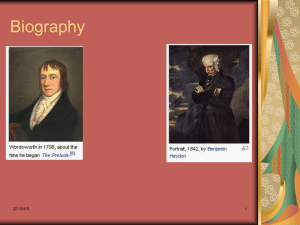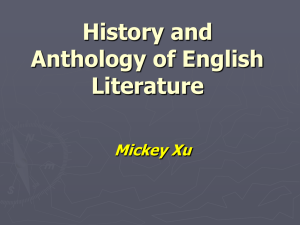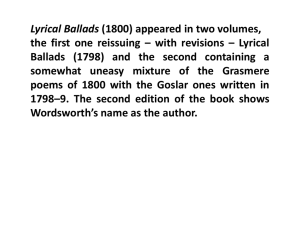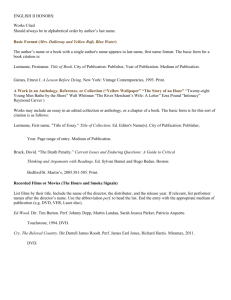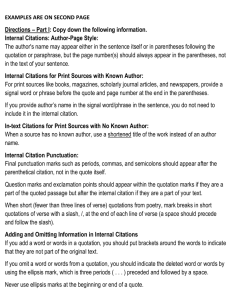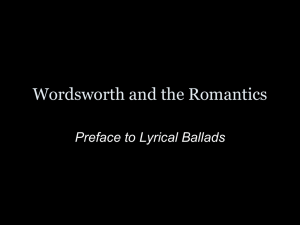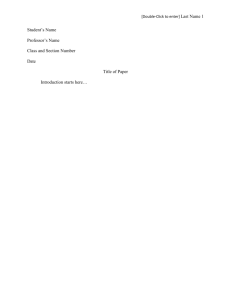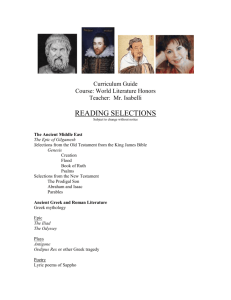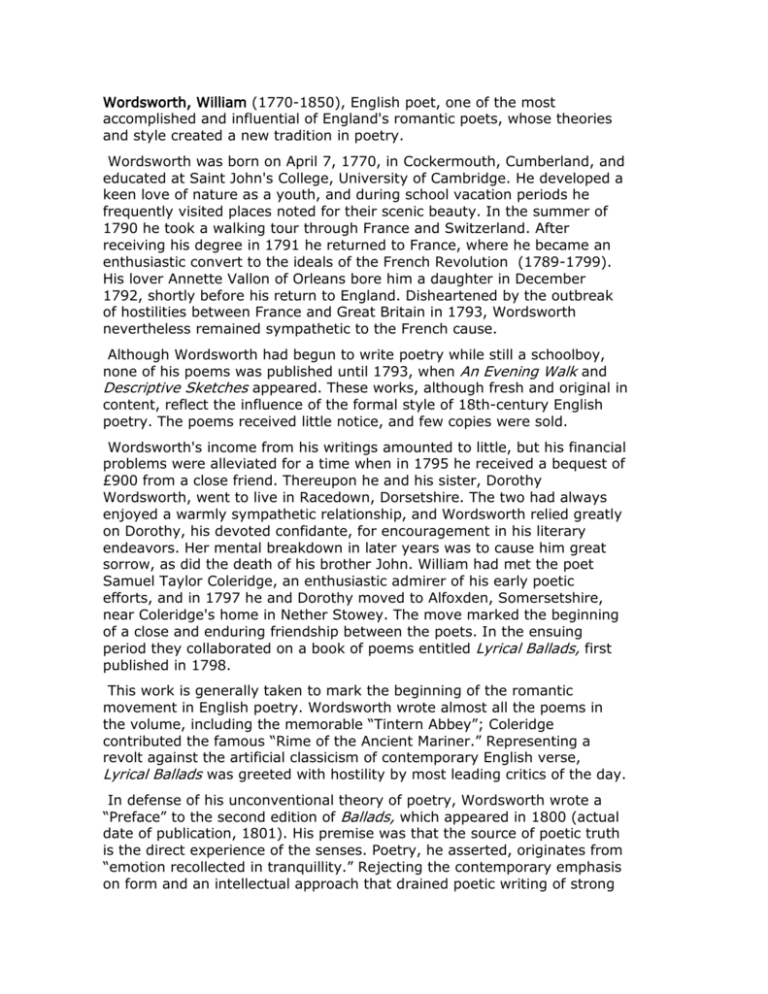
Wordsworth, William (1770-1850), English poet, one of the most
accomplished and influential of England's romantic poets, whose theories
and style created a new tradition in poetry.
Wordsworth was born on April 7, 1770, in Cockermouth, Cumberland, and
educated at Saint John's College, University of Cambridge. He developed a
keen love of nature as a youth, and during school vacation periods he
frequently visited places noted for their scenic beauty. In the summer of
1790 he took a walking tour through France and Switzerland. After
receiving his degree in 1791 he returned to France, where he became an
enthusiastic convert to the ideals of the French Revolution (1789-1799).
His lover Annette Vallon of Orleans bore him a daughter in December
1792, shortly before his return to England. Disheartened by the outbreak
of hostilities between France and Great Britain in 1793, Wordsworth
nevertheless remained sympathetic to the French cause.
Although Wordsworth had begun to write poetry while still a schoolboy,
none of his poems was published until 1793, when An Evening Walk and
Descriptive Sketches appeared. These works, although fresh and original in
content, reflect the influence of the formal style of 18th-century English
poetry. The poems received little notice, and few copies were sold.
Wordsworth's income from his writings amounted to little, but his financial
problems were alleviated for a time when in 1795 he received a bequest of
£900 from a close friend. Thereupon he and his sister, Dorothy
Wordsworth, went to live in Racedown, Dorsetshire. The two had always
enjoyed a warmly sympathetic relationship, and Wordsworth relied greatly
on Dorothy, his devoted confidante, for encouragement in his literary
endeavors. Her mental breakdown in later years was to cause him great
sorrow, as did the death of his brother John. William had met the poet
Samuel Taylor Coleridge, an enthusiastic admirer of his early poetic
efforts, and in 1797 he and Dorothy moved to Alfoxden, Somersetshire,
near Coleridge's home in Nether Stowey. The move marked the beginning
of a close and enduring friendship between the poets. In the ensuing
period they collaborated on a book of poems entitled Lyrical Ballads, first
published in 1798.
This work is generally taken to mark the beginning of the romantic
movement in English poetry. Wordsworth wrote almost all the poems in
the volume, including the memorable “Tintern Abbey”; Coleridge
contributed the famous “Rime of the Ancient Mariner.” Representing a
revolt against the artificial classicism of contemporary English verse,
Lyrical Ballads was greeted with hostility by most leading critics of the day.
In defense of his unconventional theory of poetry, Wordsworth wrote a
“Preface” to the second edition of Ballads, which appeared in 1800 (actual
date of publication, 1801). His premise was that the source of poetic truth
is the direct experience of the senses. Poetry, he asserted, originates from
“emotion recollected in tranquillity.” Rejecting the contemporary emphasis
on form and an intellectual approach that drained poetic writing of strong
emotion, he maintained that the scenes and events of everyday life and
the speech of ordinary people were the raw material of which poetry could
and should be made. Far from conciliating the critics, the “Preface” served
only to increase their hostility. Wordsworth, however, was not
discouraged, continuing to write poetry that graphically illustrated his
principles.
Before the publication of the “Preface,” Wordsworth and his sister had
accompanied Coleridge to Germany in 1798 and 1799. There Wordsworth
wrote several of his finest lyrical verses, the “Lucy” poems, and began The
Prelude. This introspective account of his own development was completed
in 1805 and, after substantial revision, published posthumously in 1850.
Many critics rank it as Wordsworth's greatest work.
Returning to England, William and his sister settled in 1799 at Dove
Cottage in Grasmere, Westmorland, the loveliest spot in the English Lake
District. The poet Robert Southey as well as Coleridge lived nearby, and
the three men became known as the Lake Poets. In 1802 Wordsworth
married Mary Hutchinson, a childhood friend, who is portrayed in the
charming lyric “She Was a Phantom of Delight.” In 1807Poems in Two
Volumes was published. The work contains much of Wordsworth's finest
verse, notably the superb “Ode: Intimations of Immortality,” the
autobiographical narrative “Resolution and Independence,” and many of
his well-known sonnets.
In 1813 Wordsworth obtained a sinecure as distributor of stamps for
Westmorland at a salary of £400 a year. In the same year he and his
family and sister moved to Rydal Mount, a few kilometers from Dove
Cottage, and there the poet spent the remainder of his life, except for
periodic travels.
Wordsworth's political and intellectual sympathies underwent a
transformation after 1800. By 1810 his viewpoint was staunchly
conservative. He was disillusioned by the course of events in France
culminating in the rise of Napoleon; his circle of friends, including the
Scottish author Sir Walter Scott, also influenced him in the direction of
orthodoxy.
As he advanced in age, Wordsworth's poetic vision and inspiration dulled;
his later, more rhetorical, moralistic poems cannot be compared to the
lyrics of his youth, although a number of them are illumined by the spark
of his former greatness. Between 1814 and 1822 his publications included
The Excursion (1814), a continuation of The Prelude but lacking the power
and beauty of that work; The White Doe of Rylstone (1815); Peter Bell
(1819); and Ecclesiastical Sonnets (1822). Yarrow Revisited and Other
Poems appeared in 1835, but after that Wordsworth wrote little more.
Among his other poetic works are The Borderers: A Tragedy (1796;
published 1842), Michael (1800), The Recluse (1800; published 1888),
Laodamia (1815), and Memorials of a Tour on the Continent (1822).
Wordsworth also wrote the prose works Convention of Cintra (1809) and A
Description of the Scenery of the Lakes in the North of England (1810;
reprinted with additions, 1822).
Much of Wordsworth's easy flow of conversational blank verse has true
lyrical power and grace, and his finest work is permeated by a sense of the
human relationship to external nature that is religious in its scope and
intensity. To Wordsworth, God was everywhere manifest in the harmony of
nature, and he felt deeply the kinship between nature and the soul of
humankind.
The tide of critical opinion turned in his favor after 1820, and Wordsworth
lived to see his work universally praised. In 1842 he was awarded a
government pension, and in the following year he succeeded Southey as
poet laureate. Wordsworth died at Rydal Mount, April 23, 1850, and was
buried in the Grasmere churchyard.
Contributed By:
Michael G. Sundell
1
1"Wordsworth, William."Microsoft® Encarta® Encyclopedia 2001. © 1993-2000 Microsoft
Corporation. All rights reserved.

